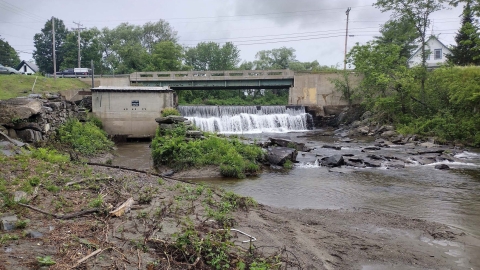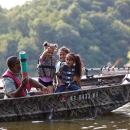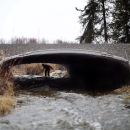States
MaineThis project will remove two dams on tributaries to the Sandy River: Lemon Stream Dam in Starks and Chesterville (Mercer) Dam on Little Norridgewock Stream in Chesterville. The removals will reconnect the two tributaries with the largest amount of inaccessible Atlantic salmon habitat within the Sandy River watershed, restoring access to 54 miles of stream containing 1,334 units of Atlantic salmon habitat, and 388 acres of ponds documented as inaccessible alewife habitat by the Maine Department of Marine Resources. The projects will also remove two non-functional dams in poor condition to reduce flood risk and improve resilience, address community needs for fire protection, and improve water levels and wetland function for waterfowl in the Chesterville Wildlife Management Area.
Project Quick Facts:
| Location | Maine |
| NFPP Project Funding | $630,000 |
| Restoration Techniques | Dam Removal |
| Partner Project Lead | Atlantic Salmon Federation |
The National Fish Passage Program combines technical expertise with a track record of success.
Implemented primarily through the Service's Fish and Wildlife Conservation Offices, the National Fish Passage Program provides financial and technical assistance to partners across the country. Since 1999, the program has worked with over 2,000 local communities, Tribes, and private landowners to remove or bypass over 3,400 barriers to fish passage fish passage
Fish passage is the ability of fish or other aquatic species to move freely throughout their life to find food, reproduce, and complete their natural migration cycles. Millions of barriers to fish passage across the country are fragmenting habitat and leading to species declines. The U.S. Fish and Wildlife Service's National Fish Passage Program is working to reconnect watersheds to benefit both wildlife and people.
Learn more about fish passage and reopen access to over 61,000 miles of upstream habitat for fish and other animals. Staff have expertise in fish migration and biology as well as financial, engineering, and planning assistance to communities, Tribes, and landowners to help them remove barriers and restore rivers for the benefit both fish and people.
Fish passage project proposals can be initiated by any individual, organization, government, or agency. However, proposals must be submitted and completed in cooperation with a Fish and Wildlife Conservation Office. (Please note that fish passage projects being used for federal or state compensatory mitigation or required by existing federal or state regulatory programs are not eligible for funding through the National Fish Passage Program.)
CONTACT A FISH PASSAGE COORDINATOR IN YOUR AREA TO GET STARTED.



